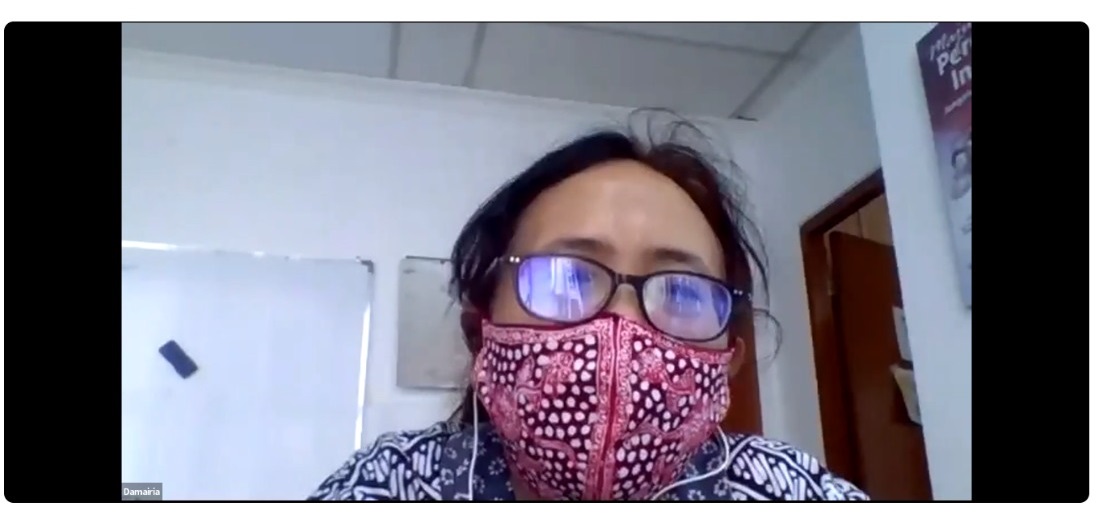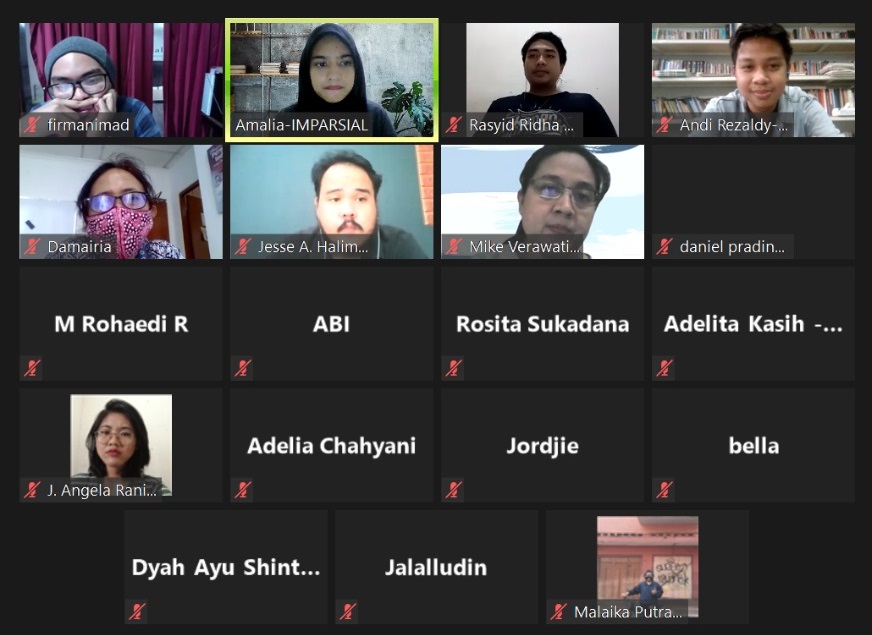[Jakarta] 22 February, 2021
“If the ITE Law cannot provide a sense of justice, I will ask the DPR to jointly revise this law, this ITE Law”
(President Joko Widodo during a TNI-Polri leadership meeting at the State Palace, Monday 15/2/2021)
The President’s statement is a reaction to the public unrest towards the many criminalization practices the government has carried out against those who publicly criticize the Electronic Information and Transactions (ITE) Law.
Although a step in the right direction, the President’s statement would certainly be in vain if the government does not engage in any real follow-up.

Not only disturbing in the general “sense of justice”, but the ITE Law is also actively used to silence criticism and obstruct the work of human rights defenders. In our monitoring, the number of attacks against human rights defenders experienced a sharp increase in 2019 and 2020. Ironically, more than half of these attacks were carried out by government actors.
One of the most controversial articles in the ITE Law, article 28 paragraph (2), was created to prevent the spread of hate speech based on identity (such as race and religion), but in practice, it is often used to silence legitimate critical voices. In this context, the law is used to target human rights defenders, who exercise their right to criticize the performance and policies of the government, and who as a result are the most vulnerable to criminalization.
This is what happened to Marco Jayakusuma, an activist for the Rujak Center for Urban Studies (RCUS), who was reported by Agung Sedayu Group, the property developer PIK 2, for criticizing the environmental destruction they were responsible for. In the SAFEnet report, from 2016 to 2020, criminalization from cases under articles 27 (defamation), 28 (hate speech), and 29 (threats of violence) show a conviction rate of 96.8% and an imprisonment ratio of 88%. This high percentage makes the ITE Law likely to be used as a tool to obstruct the work of human rights defenders.
However, we consider that the repression of human rights defenders has deeper roots: the government’s mindset when facing public criticism tends to be repressive and is not just the result of Article 27, also known as the “rubber article ” in the ITE Law. The government also often makes arbitrary arrests, carries out torture, and uses excessive force when facing demonstrations. In addition, the criminalization of human rights defenders is where other problematic legal instruments are used, such as Article 162 of the 2009 Law on Mineral and Coal Mining; Article 69 of the 2009 Law concerning Insulting the State Emblem; Articles 104, 106, 107 of the Criminal Code on treason; articles 310, 311 of the Criminal Code on insults; and articles 156 and 157 of the Criminal Code on sedition (rebellion).
The absence of State recognition of human rights defenders also hinders efforts to provide them protection, even when the State is obliged to do so according to the United Nations Declaration on Human Rights Defenders of 1998.
The revision of the ITE Law could be an important first step. The problems in the ITE Law are too deep to be addressed solely with interpretive guidelines, as pushed by some parts of the government. Ideally, the government needs to review all problematic articles in the ITE Law, as well as reinforce the protection of human rights defenders by revising Law No. 39 of 2009 on Human Rights.
The situation regarding human rights defenders in Indonesia has also been in the international spotlight. In May 2017, for the third time, Indonesia had its human rights situation reviewed by the UN Human Rights Council under the Universal Periodic Review (UPR) mechanism. In the third cycle of the Indonesian UPR, the country received 225 recommendations regarding its domestic human rights situation from 101 Member States. 167 recommendations were accepted and the remaining 58 were recorded. Of the 167 recommendations received, five were related to human rights defenders, coming from Mexico, Norway, Ecuador, France, and Iraq. The five recommendations outlined the behavior and actions that the government should take to protect and support human rights defenders, such as: taking legislative measures to deter and fight intimidation against human rights defenders, journalists, and civil society; ensuring an enabling environment for the work of human rights defenders; and facilitate the work of human rights defenders and journalists in the country.
By taking a stand to accept the UPR recommendations, the Indonesian government has to take concrete actions so that they materialize into real change. In 2022, the situation of Indonesia’s human rights defenders will be reviewed again. Based on the above, if the government is serious about guaranteeing freedom of expression and human rights in Indonesia, we urge:
- The President ordered the Minister of Law and Human Rights to start the process of revising the ITE Law, as well as reviewing all problematic articles in other laws and regulations that are prone to be misused to silence the freedom of expression of the public, especially by human rights defenders.
- The President to order the Attorney General to have the courage to sue all those who are currently being charged or accused under oppressive articles, especially within the ITE Law;
- The President to order the Chief of Police to stop all forms of criminalization using these oppressive articles, especially within the ITE Law;
- The President ordered the Minister of Law and Human Rights to revise Law No. 39 of the 1999 Law on Human Rights to guarantee normative protection for human rights defenders.
Human Rights Defenders Coalition
(IMPARSIAL, HRWG, Kontras, Indonesian Women’s Coalition, LBH Jakarta,
Yayasan Perlindungan Insani Indonesia / Protection Desk Indonesia)


